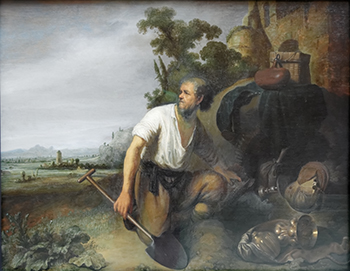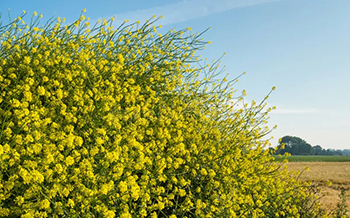From Our Archives
Michael Fitzpatrick, "The Good News that God is For Us" (2020); Dan Clendenin, "Asking for Anything" (2017) and "You Belong to God" (2014).
For Sunday July 30, 2023
Lectionary Readings (Revised Common Lectionary, Year A)
Genesis 29:15-28 or 1 Kings 3:5-12
Psalm 105:1-11, 45b or Psalm 128 or Psalm 119:129-136
Romans 8:26-39
Matthew 13:31-33, 44-52
This Week's Essay
Michael Fitzpatrick is a lay teacher and preacher in The Episcopal Church. After growing up in the rural northwest, he served over five years in the U. S. Army as a Chaplain's Assistant, including two deployments to Iraq. After completing his military service, Michael has done graduate work in literature and philosophy. He is now finishing his PhD at Stanford University.
By trade, I am a teacher. I earn my living by teaching philosophy at various colleges. Teaching is not merely my trade, however; it is also my passion. We recognize that sometimes we do work that we are not personally invested in. What makes our labors into passions? For me, teaching is my passion because it is what I love to do. I’d do it for free if that were possible, as education is not about the money but about transforming minds young and old.
“It is what I love to do.” The word ‘love’ gets bandied about a lot in Western culture, to the point that it doesn’t carry much force in typical use. Yet behind our mundane word lies diverse treasures. Some loves are simple preferences, objects and activities we find enjoyable or comforting. Other loves signify relationships of affection, like those with family or friends. Another form of love is erotic love. Sadly, in our pornographic, imagistic culture, the word ‘erotic’ has almost become synonymous with carnal sexuality. At the very least, few of us would associate it with anything other than romantic attachments.
Yet eros is the root love behind our notion of something being a passion. In past human communities, erotic love signified love motivated by intense desire for that which is loved. My passion for teaching is an erotic love because it’s not simply pleasure that inspires me — teaching is not merely something I like to do. Rather, something within me compels me to teach. Desire is an almost painful experience, where an aching longing we find in our spirit grips us with a kind of mania that propels us to action. I teach because my desire is only fulfilled when a student achieves an “a-ha” moment, and like all desires each fulfillment simply pushes me to pursue more and more “a-ha” moments in my students.
 |
|
The Parable of the Hidden Treasure, oil on oak painting attributed to either Rembrandt or Gerrit Dou.
|
My passion for teaching, my erotic love for sharing what I have learned with others, is akin to the passionate Christian life. In the first few centuries of the Church, preachers would often give sermons from that breathtaking collection of Jewish love poetry Song of Songs, because it was felt to be the best exemplar of the erotic passion we as Christians feel towards God revealed in Christ. I’ve brought Song of Songs up before in lectionary essays. Mostly absent from the RCL lectionary, we don’t get many opportunities to hear preachers give sermons from this text in our modern church contexts.
For example, the Medieval divine St. Bernard of Clairvaux has some wonderful homilies on the Song of Songs illuminating how its effusions of longing represent the passion of the Christian life. St. Bernard notes that the poem’s lovers are a bride and bridegroom. “But why a bride?” he asks. “Because she is the soul thirsting for God.” Her intense passion for her lover exemplifies the soul longing for God. Not liking God, not preferring God, not merely enjoying God, but thirsting for God.
Nor does St. Bernard shy away from letting the full portrait of erotic love capture the Christian’s love for God. He writes further,
No sweeter names can be found to embody that sweet interflow of affections between the Word and the soul, than bridegroom and bride. Between these all things are equally shared, there are no selfish reservations, nothing that causes division. They share the same inheritance, the same table, the same home, the same marriage-bed, they are flesh of each other’s flesh.
This is passionate love for God and the things of God! We are so entwined with God in our faith that there is nothing we keep back, no part of our selves that is not fully shared with our Creator. When we worship, when we take the Eucharist, when we confess our sins, when we love our enemies, when we edify our sisters and brothers in Christ, we do these things out of “that sweet interflow of affections” between Jesus and our soul. For St. Bernard, Song of Songs teaches us how to worship, how to show up at Holy Communion or the Daily Office to tell our Lord and Savior that we are faint with love (Song of Songs 5.8).
 |
|
Pearl of Great Price painting by M. Theresa Leake, 2014.
|
In our Gospel reading for this Sunday, Jesus gives five startling images of the kingdom of heaven. The kingdom of heaven is the name for Creation when it is rightly-ordered by the goodness of God. Jesus’ images serve both to give glimpses of the kingdom and to teach us how we are to feel about it. Is the kingdom merely a preference, something that we should enjoy the way we enjoy butter pecan ice cream? Is it something we’re fond of the way we’re fond of a grandparent?
Hardly. Jesus teaches that one who rightly sees the kingdom of heaven is gripped by a passionate love for it, a consuming desire.
The kingdom of heaven is like treasure hidden in a field, which someone found and hid; then in his joy he goes and sells all that he has and buys that field.
Jesus is talking about erotic love here! When we fall for someone who leaves us in the grip of erotic passion, we’re willing to do whatever it takes to see them again (for to be apart from a lover is painful). When we glimpse the kingdom of heaven we will do anything to enter its realm. The kingdom is a treasure in a field that is so wonderful, we will do whatever it takes to acquire that treasure, even to buy the whole field!
Again, the kingdom of heaven is like a merchant in search of fine pearls; on finding one pearl of great value, he went and sold all that he had and bought it.
The kingdom of heaven is our passion! We have fallen in love with it, we relish it, we ache when we’re apart from it, and we’ll do everything we can to commit our lives to it, for it is the pearl of great price.
We fall in love with the kingdom of heaven by luxuriating in the scriptures and the Church’s liturgies. We thirst for glimpses and epiphanies of the kingdom as it breaks into our world through Christ’s Body. In Jesus’ other images from our Gospel, he depicts the kingdom as that which from the tiniest speck of good infection expands to fill everything. It’s like a small mustard seed that becomes a field of large plants for all the birds to sit on. It’s like yeast that leavens the whole dough. It’s like a net that catches all the fish. O Lord, we are faint with love for this kingdom!
 |
|
Black Mustard plants in bloom. |
In Jesus’ final image, he adds that the kingdom is Creation cleansed, purged of all evil. The good fish will be separated from the bad, evil from righteousness. While it is a word of warning, it is also a word of hope, for the kingdom of heaven cannot be a place where evil festers and destroys. It is the place where God’s goodness reigns supreme and touches everything.
Let not our preaching on the parables of the kingdom fail to be passionate enough to capture the full fervor of Jesus’ teaching. By placing the Song of Songs alongside our readings for today, we can infuse our vision and our hearts with the kind of erotic love for the things of God necessary to seize the passion for the kingdom that Jesus is inviting us to. As we’re at Holy Communion this week, as we sing the hymns, as we pray together, as we listen to scripture read and exhorted, may we open ourselves to these activities as opportunities for falling in love with God, to become souls thirsting for the kingdom of heaven, until the Word and our souls are so united we can dare to say they share the same marriage-bed.
For that is what it means to sell all we have and buy the field with the treasure, the pearl of great value.
— Quotations by St. Bernard of Clairvaux taken from The Works of Bernard of Clairvaux, Vol. II, trans. by Kilian Walsh, pp. 38–39.
Weekly Prayer
Bernard of Clairvaux (1090–1153)
Jesus, the very thought of Thee,
with sweetness fills my breast,
but sweeter far Thy face to see,
and in Thy presence rest.Nor voice can sing, nor heart can frame,
nor can the memory find
a sweeter sound than Thy blest name,
o Savior of mankind.O hope of every contrite heart
o joy of all the meek,
to those who fall, how kind Thou art!
how good to those who seek!But what to those who find? Ah this
nor tongue nor pen can show:
the love of Jesus, what it is
none but His loved ones know.Jesu, our only joy be Thou,
As Thou our prize wilt be:
Jesu, be Thou our glory now,
And through eternity.Taken from Jay Hopler and Kimberly Johnson, editors, Before the Door of God; An Anthology of Devotional Poetry (New Haven: Yale University Press, 2013), 425pp.
Michael Fitzpatrick welcomes comments and questions via m.c.fitzpatrick@outlook.com
Image credits: (1) Wikimedia.org; (2) Fine Art America; and (3) Dreamstime.com.





